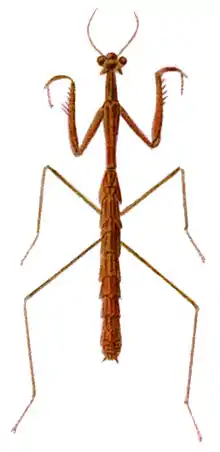
Hoplocorypha macra, a species of African stick mantis. Illustration by M. Beier, 1935
Stick mantis and twig mantis are common names applied to numerous species of mantis that mimic sticks or twigs as camouflage. Often the name serves to identify entire genera such as is the case with:[1][2][3][4]
- Brunneria (including Brunner's stick mantis, the Brazilian stick mantis and the small-winged stick mantis)
- Hoplocorypha (the African stick mantises)
- Paratoxodera (including the Borneo stick mantis and the giant Malaysian stick mantis)
- Popa (African twig mantis)[5]
In cases, some but not all members of a genera are called by a variation of one of these names. For example:
- Archimantis latistyla (Australian stick mantis)[6]
- Pseudovates peruviana (Peruvian stick mantis)[7]
Similar insects

The stick insect Argosarchus horridus belongs to the Phasmatodea, not to the stick mantises. Illustration by George Vernon Hudson, 1892
Stick mantises should not be confused with stick insects (Phasmatodea) although the latter were long-considered close relatives of all mantises according to classification which is now often considered paraphyletic and outdated. Likewise, both mantises and stick insects are separate from the recently identified Mantophasmatodea.
See also
References
- ↑ Dichotomous Key to Species of Mantids that may occur in Florida
- ↑ Department of Entomology and Nematology of the University of Florida Archived 2008-06-12 at the Wayback Machine
- ↑ Phasmids in Cyberspace
- ↑ Texas A&M University Archived November 2, 2008, at the Wayback Machine
- ↑ Phasmids in Cyberspace
- ↑ Tree of Life Web Project. 2005 Archived June 6, 2011, at the Wayback Machine
- ↑ Texas A&M University
This article is issued from Wikipedia. The text is licensed under Creative Commons - Attribution - Sharealike. Additional terms may apply for the media files.